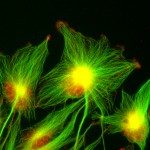Lien vers Pubmed [PMID] – 38091012
Lien DOI – 10.1083/jcb.202308069
J Cell Biol 2024 Jan; 223(1):
Cell polarity, which consists of the morphological, structural, and functional organization of cells along a defined axis, is a feature of healthy cells and tissues. In contrast, abnormal polarity is a hallmark of cancer cells. At the molecular level, key evolutionarily conserved proteins that control polarity establishment and maintenance in various contexts are frequently altered in cancer, but the relevance of these molecular alterations in the oncogenic processes is not always clear. Here, we summarize the recent findings, shedding new light on the involvement of polarity players in cancer development, and discuss the possibility of harnessing cell polarity changes to better predict, diagnose, and cure cancers.

